|
|
This week in: Peace & Security Publications |
IPSI | Africa | Americas | East Asia | Europe & Central Asia | Middle East | South Asia
|
|
|
|
|
This week in Peace & Security Publications
|
|
|
|
|
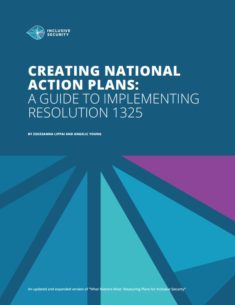
Inclusive Security: This guide explains how to use principles of results-based design and monitoring and evaluation as vital tools to make UN Security Council Resolution (UNSCR) 1325 a reality.
|
|

HRW: Even after two decades of controversy and debate, there remains no research showing that early, medically unnecessary surgery is helpful to the intersex child.
|
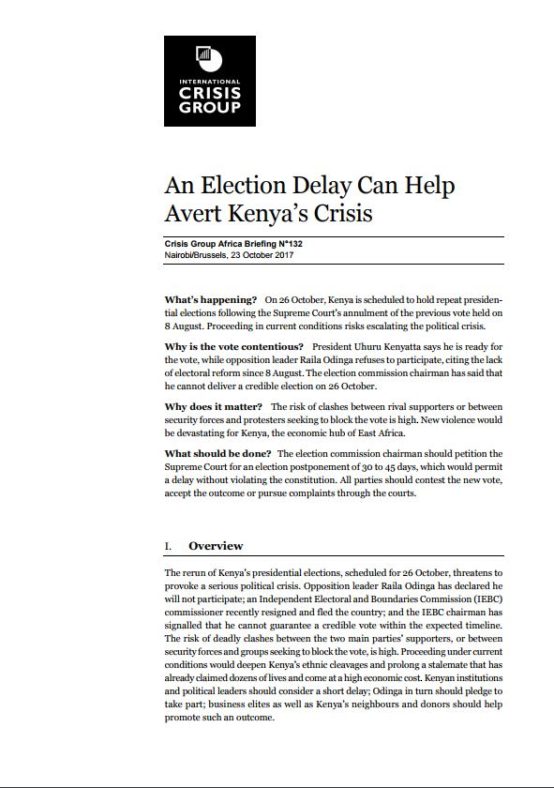
International Crisis Group: The rerun of Kenya’s presidential elections, scheduled for 26 October, threatens to provoke a serious political crisis.
|
|
|
|
|
|
|

Keynote Speaker for The Hague 2014 Symposium Emmanuel Jal begins his 6th studio album in collaboration with his sister, Nyaruach.
|
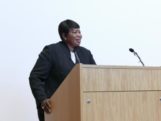
2016 The Hague Symposium Keynote Speaker Fatou Bensouda gave the annual Oxford Global Justice Lecture at the University of Oxford.
|
|
|
|
|
|
|
This week in Sub-Saharan Africa
|
|
|
|
|
CONGO: UN condemns arrests of opposition members
On Monday, the UN Peacekeeping Mission in Congo condemned the arrest of nearly 30 opposition members amid a crackdown on dissent by President Joseph Kabila’s government, urging Congolese authorities to release immediately and unconditionally those arbitrarily arrested. The arrests occurred in the southeastern city of Lubumbashi on Sunday when police broke up a meeting by the Union for Democracy and Social Progress (UDPS) party on the eve of a return to the city of opposition leader Felix Tshisekedi. The country’s security incidents are threatening to spiral out of control because of Kabila’s refusal to hold elections when his presidential mandate expired nearly a year ago. Congo’s government banned opposition demonstrations last year after security forces killed dozens of protesters demanding Kabila’s departure. Comment: The election commission said this month that an election to replace Kabila, who came to power after his father’s assassination in 2001, would not be possible before April 2019 at the earliest, raising the prospect of long term unrest. (Reuters, Africafrique.com, Jurist)
|
|
|
|
|
|
KENYA: Opposition leader vows to form “resistance movement”
On Wednesday, Raila Odinga, the leader of Kenya’s primary opposition party, urged his supporters to boycott a rerun of the country’s disputed presidential elections, which took place Thursday amid rising political tensions and fears of violence. The opposition leader urged his political coalition to become a “resistance movement.” The country’s Supreme Court on Wednesday failed to muster enough judges to hear a last-minute petition to postpone the elections. Comment: The Supreme Court shocked Kenya last month when it nullified President Kenyatta’s August re-election, citing irregularities and illegalities, as well as the electoral commission’s unwillingness to let court-appointed technicians scrutinize its computer systems. Odinga challenged President Kenyatta’s victory, claiming hackers infiltrated the computer servers and manipulated the vote. (Aljazeera, News24, The Guardian)
|
|
|
|
|
|
TOGO: Protests to end 50-year ruling family dynasty erupt in violence
On Thursday, security forces and police shut down Lome, the capital of Togo in a bid to prevent anti-government demonstrations from taking place. Several rallies have been held since August, demanding an end to the 50-year ruling family dynasty. Protestors want to see constitutional reforms, including a two-term limit for presidents. Damehame Yark, the country’s Security Minister, told reporters that at least four people died this week as protestors clashed with security forces in the capital and northern town of Sokode. At least 60 people were arrested across the country. According to Amnesty International, the death toll since August is now eight. Comment. The Pan-African National Party (PNP) led the first protest in August, which called for constitutional and institutional reforms. These demands later evolved to a call for the president to step down. (Aljazeera, Africa News, Independent online)
Researched/Written by Brian Adienge
|
|
|
|
|
|
This week in the Americas & Caribbean
|
|
|
|
|
CHILE: Indigenous tribe acquitted of arson attack on disputed ancestral territory
On Wednesday, the Chilean court acquitted 11 members of the Mapuche tribe of charges related to an arson attack towards an elderly couple’s property. Prosecution stated that insufficient evidence was provided to prove that Mapuche members had been involved in the incident. Deputy Interior Secretary Mahmud Aleuy has called for Chilean citizens to abide by the court’s decision and the work of the Attorney General’s office. Comment: Relations within ancestral territory of the Mapuche tribe have been hostile since the invasion of the Chilean army in the 1800s. The Mapuche are the largest group of Indigenous people living in Chile. (Latin American Herald Times, ABC News, BBC News)
|
|
|
|
|
|
NICARAGUA: Country officially joins global climate agreement, leaving behind the U.S. and Syria
On Monday, Nicaragua became the latest country to sign onto the Paris Climate Accord, leaving only two countries who have not joined – the United States and Syria. Nicaraguan Vice President, Rosario Murillo, announced that official documents have been submitted to the United Nations in order to join the historic agreement, yet Nicaraguan President Daniel Ortega announced in September that the country planned to reconsider. Officials in the capital city of Managua originally believed that the climate deal did not do enough to protect the world from climate change. Comment: Even though various countries have adopted the climate deal, the future of the agreement has been questioned since the United States withdrew from the deal this past summer. (The New York Times, The Washington Post, The Guardian)
|
|
|
|
|
|
PERU/URUGUAY: UN Human Rights Commissioner visits countries for human rights reform
On Monday, UN High Commissioner for Human Rights Zeid Ra’ad Al Hussein visited Peru and then traveled to Uruguay on Wednesday to address human rights concerns in both countries. Primary focus was given to how each respective government could establish proper protocol to make progress towards human rights for their citizens. Al Hussein launched a joint action plan by UNHCR and the Inter-American Commission on Human Rights (IACHR) to give protections to human rights defenders throughout the Americas. Comment: Peruvian President Pedro Pablo Kuczynski has formally addressed how Peru’s government is committed to the protection and progress of human rights in the country. Uruguay President Tabaré Vazquez has made no official comment. (Peruvian Times, The Santiago Times, MercoPress)
Researched/Written by Blessing Ikpa
|
|
|
|
|
|
This week in East Asia & Pacific
|
|
|
|
|
AUSTRALIA: Six hundred detainees refusing to leave Manus Island
On Monday, hundreds of detainees refused to leave the Manus Island Detention Center in Papua New Guinea, which is managed by Australia to curb refugee flows into Australia. Australia rejected asylum claims from 156 of these refugees and encouraged them to return to their origin country, despite well-founded fear of persecution. The remaining refugees will be moved to Australian-funded Lorengau Refugee Transit Center, also located in Papua New Guinea. UN and rights groups cite human rights abuses among detainees in the centers. Comment: The detention center is due to close this Tuesday and will cut off detainees’ access to drinking water, food, medical treatment, electricity, and sewage. (Human Rights Watch, Al Jazeera, The Guardian)
|
|
|
|
|
|
CHINA: Western media outlets denied access to Xi Jinping’s speech
On Wednesday, reporters from BBC, the Economists, the Financial Times, the New York Times, and the Guardian were refused access to President Xi Jinping’s statement to the media after unveiling his new leadership. More than 200 journalists were able to attend, including CNN, but foreign journalists had limited cell phone reception and could only use internal lines provided by the Chinese state media. Comment: On Wednesday, Xi Jinping began a second-five year term as President of the Communist Party and unveiled seven leaders of the Politburo Standing Committee, the country’s decision making body. (Strait Times, CNN, NPR, BBC, The Guardian)
|
|
|
|
|
|
JAPAN: Prime Minister Abe and President Trump to raise pressure on North Korea
On Monday, Prime Minister Shinzo Abe and U.S. President Donald Trump agreed to pressure North Korea, utilizing “strong diplomacy” to change its nuclear policy. North Korea recently responded to Trump’s UN speech threatening to “totally destroy” North Korea, warning that the threat to test a hydrogen bomb over the Pacific Ocean should be taken “literally.” Comment: Prime Minister Abe was re-elected on Sunday, making him Japan’s longest serving leader; a survey showed increased support for the Abe administration, but declining support for Abe himself. (CNN, Al Jazeera, Reuters 1, 2)
Researched/Written by Rabia Uddin
|
|
|
|
|
|
This week in Europe & Central Asia
|
|
|
|
|
FRANCE: Government report finds evidence of police abuses against migrants
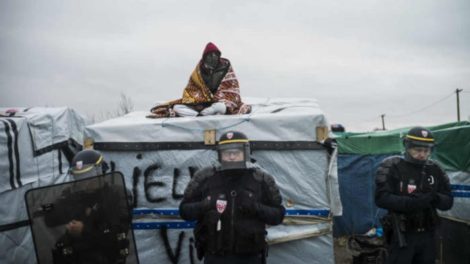 |
|
On Monday, an independent inquiry initiated by the French Interior Ministry concluded that throughout the past year French police have been using excessive force against migrants and aid workers in Calais coming from the dismantled migrant encampment known as “the Jungle.” Some violations cited in the report include intentionally using pepper spray while migrants were sleeping, directly spraying their food and bedding, and confiscating and destroying personal belongings. Members of the inquiry assert that the most serious claims regarding the use of pepper spray are “highly improbably” and “without foundation.” Comment: Approximately 500 to 700 migrants still live in Calais and the surrounding areas with limited access to basic services. Earlier this month, the United Nations requested that the French government do more to protect the migrants in this region. (Euractiv, The Guardian, The New York Times, Human Rights Watch)
|
|
|
|
|
|
NORWAY: Top three government positions are now held by women
On Friday, Ine Eriksen Søreide was appointed the new Minister of Foreign affairs, becoming the first woman top diplomat in Norway’s history. She replaces Børge Brende who was named president of the World Economic Forum. The top three senior government positions in Norway are now all held by women, with Søreide joining Prime Minister Erna Solberg and Minister of Finance Siv Jensen. Comment: The Philippines, Switzerland, and Liberia are the only other countries in which these three top offices were held by three females who governed at the same time. (The Local Norway, The Nordic Page, Business Insider, The Guardian)
|
|
|
|
|
|
UKRAINE: Two killed and three injured in bomb attack in Kyiv
On Wednesday, a bomb blast outside of the Espresso TV station in Kyiv killed two and injured three, including Radical Party Member of Parliament Ihor Mosiychuk. Mosiychuk was rushed to the hospital, but suffers only from non-life threatening injuries. Though the investigation is still active, Ukraine’s State Security Service (SBU) categorized it as a terrorist attack appearing as a targeted assassination attempt. The leader of the Radical Party, Oleh Lyashko, claims that the attack is tied to Mosiychuk’s “political views and professional activity”, especially his opposition to Russian involvement in Crimea. Mosiychuk’s bodyguard Ruslan Kushniruk and former Interior Ministry employee Mykhailo Moymyl died in the attack. This attack is the sixth attack on prominent figures opposing Russian influence since the summer of 2016. Journalist Pavlo Sheremet died in a car bomb in July 2016 and former Russian lawmaker Denis Voronenkov died in a shooting incident in March 2017. (Kyiv Post, Radio Free Europe, Reuters)
Researched/Written by Amy Pipher
|
|
|
|
|
|
This week in the Middle East & North Africa
|
|
|
|
|
IRAQ: Abadi rebuffs U.S. calls to disband Iranian-backed militias
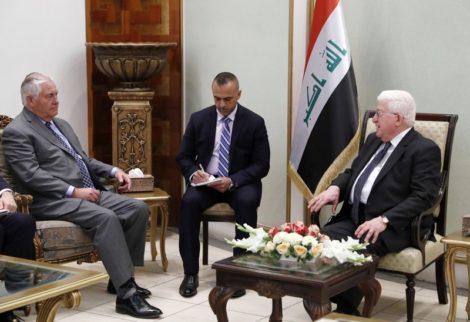 |
|
On Monday, U.S. Secretary of State Rex Tillerson met with Iraqi Prime Minister Haider al-Abadi, urging him to disband the Iranian-backed Shi’ite Popular Mobilization Forces (PMF). The U.S. wants Iraq to stop using the Shi’ite militias as part of their broader efforts to isolate Iran and curb Iranian influence in Baghdad. Al-Abadi objected to the demand, calling the PMF the “hope and future of Iraq and the region.” The PMF previously assisted the Iraqi Armed Forces to defeat militants from the self-proclaimed Islamic State (IS), but Baghdad is now relying on the forces in their internal dispute with the Kurdish Regional Government (KRG), pushing them out of Kirkuk and other disputed territories to reassert central control. Comment: Both Iraq and the Kurdish Regional Government are U.S. allies, and their dispute has put Washington in an awkward diplomatic position. While Washington sided with Baghdad in opposing Iraqi Kurdistan’s independence referendum, it urged restraint as Baghdad continues to use force to bring Erbil to heel. (Al Jazeera, BBC, AP, Reuters)
|
|
|
|
|
|
SYRIA: As IS retreats from Qaryatayn, more than 70 people executed as revenge killings
On Monday, IS militants killed more than 128 civilians over the course of three weeks before retreating from Qaryatayn, a city in central Syria southeast of Homs now under control of Syrian government forces. Of those civilians, more than 70 were shot or beheaded and left in ditches or on the street for allegedly conspiring with the Syrian regime. The mass killings in Qartyatayn highlight IS’s continued ability to inflict human rights violations even as the group loses ground in Iraq and Syria. Comment: Qaryatayn changed hands between the Syrian regime and IS several times since 2015. The Syrian regime retook the city over the weekend with Russian air support, while US-backed forces retook their de facto capital in Raqqa a week ago. (SOHR, Al Jazeera, BBC, New York Times, AP)
|
|
|
|
|
|
REGIONAL: Saudi Arabia and Iraq renew diplomatic ties
Over the weekend, Iraqi Prime Minister Haidar Al-Abadi and Saudi King Salman signed a number of agreements during Al-Abadi’s visit to Riyadh, his second visit in four months. The signed agreements stipulate reopening the border to Iraq, opening a new Saudi consulate in Iraq, resuming airline flights between the two countries, as well as collaborating in a host of economic areas, including trade agreements and infrastructure projects. The rapprochement between Baghdad and Riyadh is partially due to the efforts of U.S. Secretary of State Rex Tillerson, who presided over the meeting as part of his diplomatic tour of the Middle East this week. Comment: Riyadh cut diplomatic ties with Baghdad after Saddam Hussein invaded Kuwait in 1990. The U.S. has tried to rebuild the relations between the two countries for more than a decade. (Al Jazeera, Arab News, Foreign Policy)
Researched/Written by Zachary Libow
|
|
|
|
|
|
INDIA: Controversy continues over “propaganda” Tamil Nadu film with references to government policies
On Monday, a lawyer filed a complaint against the lead actor in the controversial Tamil Nadu film, “Mersal,” arguing that the actor performs lines insensitive to Hindu religious sentiments. The complaint comes one day after filmmakers met with leaders of the Modi government to discuss allegations by members of India’s ruling Bharatiya Janata Party (BJP), that the film and it’s lead actor, known as Vijay, were part of a “hate campaign” against the Prime Minister. The film depicts a doctor who laments the state of public healthcare in India and in particular attacks the recent Goods and Services Tax, which now taxes goods and services up to 28 percent. BJP leaders called for the film to be censored, while political rivals and those in the film industry rallied in support of freedom of expression in film. Comment: The GST scheme mentioned in the film came into effect July 1, and has hurt the growth of the Indian economy due to its complex structure. A statement from Mersal producers stated that the film “speaks in support of free universal heath care [and] the film’s crux is the dream of a doctor.” BBC was also told on Sunday that “no scenes or dialogue have been deleted from the film.” (Hindustan Times, Indian Express 1, 2, Straits Times, BBC)
|
|
|
|
|
INDIA: Increase in cases of “braid-chopping” intensifies panic and fear in Kashmir
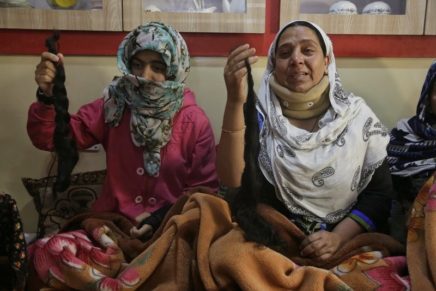 |
|
Over the past month, there have been more than 100 reported cases of Kashmiri Muslim women being attacked by masked men and having their braided hair cut off in India-administered Kashmir, creating widespread fear and panic. Government officials originally questioned the validity of the reports, even suggesting the victims were “suffering from hallucinations” or hysteria, and police still have no suspects or leads regarding motives for the attacks. Separatist leaders and members of civil society groups have alleged that the attacks are “handiwork of Indian agencies” trying to instill fear amongst rebellious Kashmiris, or to divert public attention away from political issues including Article 35-A in India’s constitution concerning the governance of Jammu and Kashmir, and the campaign for an independent Kashmir. Vigilante groups have begun patrolling the streets and have gone as far as attacking individuals suspected of being “braid-choppers,” including foreign tourists, several soldiers, police officers, and civilians, killing one. Comment: Similar braid-cutting incidents were reported in Northern India in July, which officials responded to by bringing in psychiatrists to determine if the reported victims were suffering from mental illnesses. According to a 2015 Doctors Without Borders report, 45 percent of Kashmir’s adult population suffers from post-traumatic stress disorder or other mental disorders, and the violent targeting of women’s bodies continues to further psychological and psychiatric issues. (DailyO, Greater Kashmir, The Hindu, Straits TImes, AP)
|
|
|
|
|
|
NEPAL: European Union to monitor upcoming elections as over 700 candidates run for federal and provincial seats
|
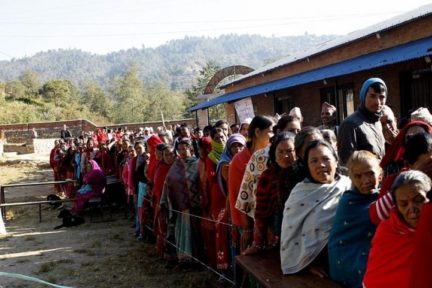 |
On Wednesday, the European Union deployed an Election Observation Mission after an invitation by Nepalese authorities ahead of the upcoming House of Representatives and provincial assemblies elections in November and December. The first local elections in twenty years took place earlier this year, and Nepal’s High Representative/Vice President Mogherini stated “the upcoming elections for the House of Representatives and provincial assemblies will be another important moment for the country and crucial for completing the constitutional transition process.” Comment: There are more than 700 candidates vying for the various political positions. The EU has monitored Nepalese elections in 2008 and 2013. A final report on the Mission’s findings will be issued after the electoral process is completed in January 2018, and will include recommendations for future electoral processes. (DDNews, The Himalayan Times, Kathmandu Post, EU)
Researched/Written by Natalie A. Landau
|
|
|
|
 |
|